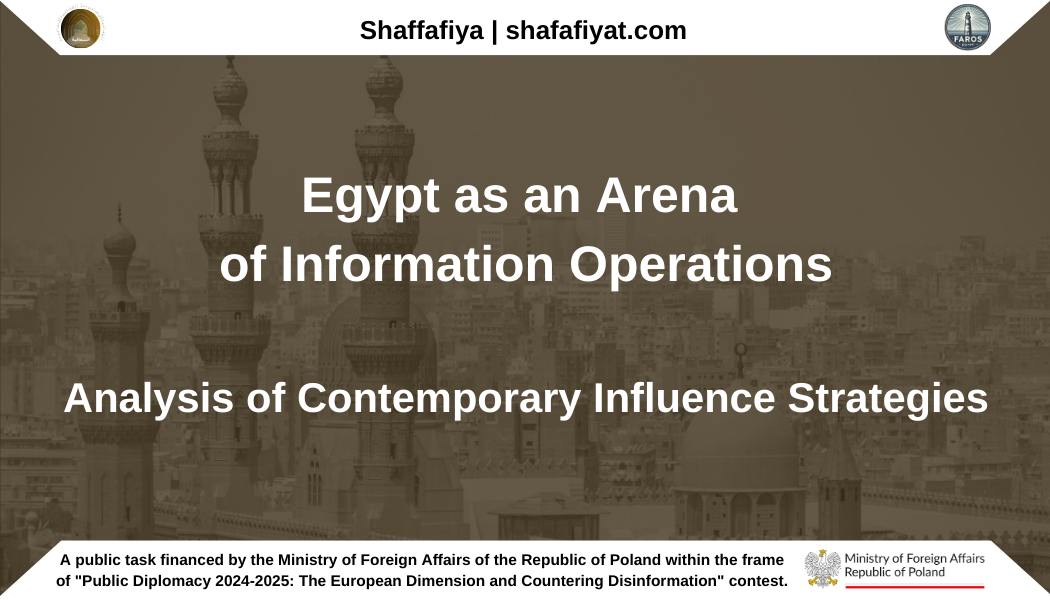* * *

* * *
In an era of constant change in the global communication sphere, the Egyptian media environment is becoming a place where advanced influence operations acquire a new dimension. Among the numerous narratives and messages that shape public opinion, the actions undertaken by Russia and China attract particular attention. Can the mechanisms used by these states influence the perception of reality in a region where emotions and historical experiences constitute a significant element in shaping social attitudes?
-
Analysis of Information Operations
Russian Influence Operations
Destabilisation of the Image of the West and Poland
Russian narratives systematically portray NATO, the EU and the USA as aggressors, destabilisers and neo-imperial forces. Particular attention is paid to Poland – presented as a key member of NATO and a state bordering Ukraine – which is attributed the role of a participant in the alleged plan to divide Ukraine. Such messages aim to undermine the trust of Egyptian society in Western structures and to create the image of Western states as aggressive instruments of imperialism.
Creating a Positive Image of Russia
In contrast to the negative portrait of the West, Russian propaganda builds the image of Russia as a stable and friendly partner. Examples of such actions include, inter alia, promoting cooperation with Egypt within the framework of BRICS, showcasing infrastructure projects such as the Dabaa nuclear power plant, as well as presenting initiatives such as collections of gifts for soldiers, which are intended to suggest broad international support for Russian aggressive actions in Ukraine.
Chinese Information Strategies
Emphasis on Economic and Technological Aspects
Chinese information activities in Egypt are characterised by a lower level of confrontationalism than those of the Russians, and their main emphasis is placed on economic issues and the modernisation of infrastructure. Key elements of the message include, inter alia, the intensive promotion of Chinese investments in the Suez Canal Economic Zone (SCZone), subtle support for anti-Western narratives through references to the alleged threat posed by NATO infrastructure in Poland, and the creation of an image of China as a reliable partner in Egypt’s energy and technological transformation.
-
Mechanisms of Psychological Operations and Propaganda Techniques
Use of Emotional Manipulations
Both strategies – Russian and Chinese – employ advanced persuasive techniques that affect the emotions of recipients. Among the key mechanisms are:
Fear and mistrust: Messages that create an impression of threat from Western interventions and military alliances.
Anger and frustration: Narratives accusing the West of economic exploitation and imposing unfavourable economic conditions.
Cultural identity: Emphasising cultural differences that are intended to suggest the imposition by the West of values incompatible with the region’s traditions.
Agenda Setting and Framing
Propaganda also employs techniques of selective topic emphasis:
Agenda setting: Pro-Russian media, such as Sputnik Arabic and RT Arabic, select topics that dominate the message, giving them strategic priority.
Framing: International events, such as military operations or political interventions, are presented in a manner that imposes a specific interpretation on the audience – often emphasising the positive image of the actions of Russia and China and the negative character of Western interventions.
-
Use of Traditional and Digital Media
In the Egyptian information space, a clear symbiosis is observed between state media and modern digital platforms. The dominance of state-controlled channels enables the widespread distribution of propaganda messages. Furthermore, social media activity is utilised, where, through repetitive narratives and engaging formats (e.g. memes, videos), younger audiences are reached.
-
Operations Targeting the Perception of Poland and NATO
Particular attention is also paid to narratives aimed against Poland and NATO. Example techniques include, for instance, creating false accusations of the division of Ukraine and portraying Poland as an aggressor, utilising events such as the closure of the Russian Consulate General in Poznań to build an image of Poland as an instrument of Western imperial ambitions, and the mobilisation of negative emotions, such as fear of destabilisation and anger towards external interference, which is intended to undermine the credibility of Western institutions.
Analysing the Egyptian information sphere, it can be stated that the information operations carried out by Russia and China are highly complex and precisely targeted. The mechanisms employed in these campaigns – from the selective choice of topics, through the repetition of the message, to the profound manipulation of emotions – can have a significant impact on shaping public opinion in Egypt. In the context of local social and economic conditions, the propagandistic actions aimed against Western states may lead to lasting changes in the perception of international alliances and political relations.
-
Source and Background of the Analysis
This analysis is based on the chapter of the report “Study of the Egyptian Information Environment”, developed within the framework of the Albatros II – MENA – Counteracting Disinformation and Information Threats to Democratic Values and Institutions, which adversely affects international relations and negatively influences the image of Poland in Lebanon, Iraq and Egypt. The report “Study of the Impact of Disinformation and Propaganda on MENA Societies — Report, Defence Strategies and Implementation of Recommendations” constitutes a multifaceted analysis of the Egyptian media environment, in which the structure and characteristics of the media, the information habits of society, and the influence mechanisms employed by external entities are presented in detail.
We invite you to familiarise yourself with the full version of the report, which provides valuable information and recommendations for analysts and experts involved in information security in the MENA region.

